25 articles

This is what it looks like when globalization collapses. The political and economic disasters brought about by COVID-19 – a crisis of our own making – have exacerbated pre-existing social problems: disinformation is spreading like bushfire; marginalized refugees have been abandoned by Europe, Roma are being over-policed, the homeless under-served, LGBTQ people outed and ousted, sex workers scapegoated. The crisis has been abused to silence press and public dissent, and as vaccination progresses, questions of global justice are intertwined with health crises.
But this unprecedented situation also offers a chance to fundamentally restructure our economies, rethink how we work altogether, appreciate what is really essential, and put social connections up front and centre.
Eurozine looks into the political and cultural factors behind the COVID-19 pandemic and reports from the frontiers.
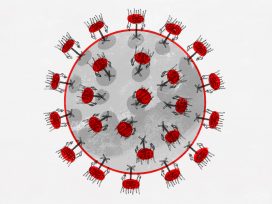

The rush to find a COVID-19 vaccine has resulted in myriad products rather than medical strategies. In the West, mostly private labs are behind what has become a precious commodity. How did public health and money become contractually tied to privately owned medicine?

The roll-out of COVID-19 vaccines gives much-needed hope. But if the drug industry keeps being devoted exclusively to profit, inequality and mistrust will cost lives in poorer countries, and eventually also in the wealthy western world.
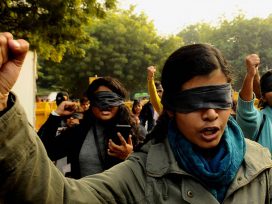
Staying home may reduce COVID-19 infection but is not the safest place for all – women with violent partners are more at risk of abuse during lockdown. And solidarity is crucial. Atreyee Sen addresses the critical situation in India, where women are also being attacked in institutions and when forced to migrate.
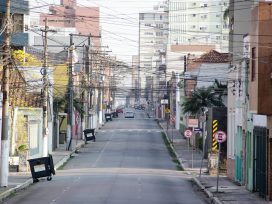
The more publicly governments articulate their difficulties in controlling the pandemic, the greater its democratic potential, argues Axel Honneth. But if people conclude that government measures have been unjustified, the result will be even greater distrust in democratic decision-making.
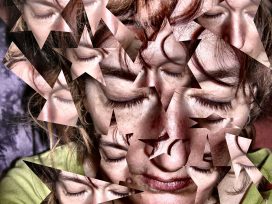
Covid has flooded our lives with online encounters and interactions. We work, minding our image on screen, or struggle to socialise in a hall of mirrors. Geert Lovink considers what we have lost and how we can reclaim our bodies, relationships and shared physical spaces.
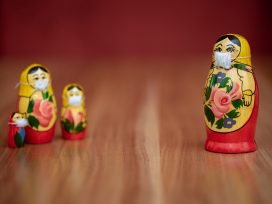
Coronavirus has collapsed powerful imaginaries of globalization: a generation raised with the promise of knowledge and mobility is stuck and without a clue. Thus we search for names and images to tame the uncertainty.
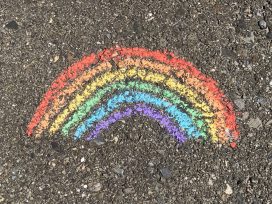
Contact-tracing, legitimized by COVID-19 security risks, is already a dating app reality. The privacy of LGBTQ communities is particularly open to abuse. Jemimah Steinfeld calls for better protection of sexual identities, citing a new Index on Censorship global report.
Coronavirus further intensified the fetishization of science. Experts are being cast as saviours; orderly lines of masked marketgoers mimic religious processions, and daily press conferences function as mass. But metrics have to be relieved from spiritual obligations.
When crisis hits, vulnerable groups suffer. And sex workers, already enduring precarity, have become the scapegoats of COVID-19’s health focus, facing heavy fines, police abuse and deportation threats. Boglárka Fedorkó investigates the lessons that can be learnt from the solidarity and organization of those facing adversity.
The corona crisis acts as a double-edged sword for Lebanese protesters: it reinforces the grievances that have fuelled the uprising, but it also provides an opportunity to political elites to bolster their support, offering welfare for political loyalty.
The pandemic prompts fundamental questions. How do we define society’s relationship to nature? How resilient are our democracies to the abuse of emergency powers? How far can science dictate political decision-making? And will the primacy of the economy remain unassailable?
Although celebrated as a gesture of solidarity, the act of applauding essential workers is really a form of social distancing from them. It is the fate of heroes that their bodies are being used to climb to the heights of national glory.
Corralling homeless people into gymnasiums and building walls around Roma settlements: the COVID-19 measures show their ugliest face when it comes to the overpolicing of marginalized groups. A European survey.
The corona pandemic has brought globalization’s defects into sharp relief. Across the spectrum, neoliberalism is being challenged. Can the narrative of beneficent globalization be revived? And as US hegemony fades, can the institutions of global governance survive?
In the months before the corona pandemic, the BBC had been battling for its political survival under a constant barrage of criticism. Then, as the crisis hit and ratings for news services rose, the government’s anti-BBC rhetoric started to disappear. Has the emergency changed attitudes to the broadcaster?



